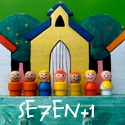If you are anything like me, you come back from overseas holidays inspired with little resolutions. I have been totally jetlagged, but also determined to throw away clothes I never wear, re-arrange my room, and write about books. For someone who reads an enourmous amount, I have very few entries under the "books" label on my blog.
So today I want to draw your attention to one of the best books I read last year: Defiant Birth. This book contains many stories of women who chose to give birth even though the medical profession advised abortion. There is a lot of pressure in Australia and other Western countries to abort disabled babies. There is also a lot of pressure on disabled women to have abortions. I cannot explain the book better than the author does at the start of her long introduction:
"It is about women who were told they should not have babies because of perceived disabilities - either in the child or themselves."
"This is a book about women who have resisted the ideology of quality control and the paradigm of perfection."
Melinda Tankard Reist ably exposes the limitations of the testing used to diagnose babies before birth, and the way women are "being forced to make agonising decisions on the basis of inadequate - even inaccurate - information."
I have a long term interest in working to reduce the number of abortions, as I see abortion as a tragedy for women and children. A tiny baby, recognisably human, is destroyed in every abortion. Many women carry the scars of this choice, often a coerced one, for the rest of their lives. In an abortion done for reasons of disability, the woman often carries the extra grief and guilt of the late abortion of a baby she originally wanted.
It is impossible to attempt to combat abortion for long without realising that our society presents to women a huge number of times when it is "wrong" to have a baby. You can be too young, too old, too busy, too ill, not educated enough, too poor, or have too many children already. If you have a baby at such times, many people deem you unwise or just plain stupid. Couldn't you have planning things better? With such thinking, the majority of time in a woman's reproductive life is defined as the "wrong time".
As I have realised the pressure this places on women who are pregnant in less than perfect circumstances, I have become an unashamed pro-natalist. This means I am positive about people choosing to have children! I object to the basic idea that their are lots of bad times to have babies. Usually, the bad times are socially created and with the right support women can get through their pregnancies and even thrive. Children should be welcomed, even in difficult circumstances.
Melinda Tankard Reist explores the way movements promoting birth control, genetic engineering and selective abortion have been fuelled by eugenic ideas. Eugenics can be defined as the idea of improving humanity by encouraging the strongest and most intelligent to reproduce and the weaker and less intelligent to prevent reproduction (page 304).
I object to the eugenicist idea that women "ought" to surgically (sterilisation, abortion) or hormonally (the pill and other hormonal birth control) alter their bodies to prevent children. Women have no duty to do this. Some people wrongly interpret my pro-natalism to mean that I oppose all birth control. I find myself needing to assure some people that I am not on a campaign to ban condoms! I do oppose any birth control that acts to prevents the implantation in the womb of an already conceived human being (hormonal birth control such as the pill is included in this). I also hold the view that welcoming children is generally preferable to preventing them, largely because I believe the Bible presents fruitfulness in the context of bearing children as a blessing.
Defiant Birth rejects the idea that women "ought" to prevent themselves from giving birth under circumstances society deems unacceptable. It does so in a way that is intellectually satisfying. Tankard Reist's exploration of society's attitudes to reproduction, disability and difference is brilliant. Reading this book was also a powerful emotional experience. I found myself uplifted as I read about women who had chosen life under difficult circumstances. If you have read Melinda Tankard Reist's Giving Sorrow Words, and wept as you read the stories of women's grief after abortion, you will find that this book is an opposite experience emotionally. You might want to cry with joy as women choose life!
This book was also personally encouraging in the context of my own minor disability. I have chronic back pain, and this often causes me to fear pregnancy, birth and raising children. Will these seasons in my life cause my pain to get much worse? Will I have less children than I would like as a result? I cannot know my future, but after reading this book I was encouraged. I realised that many women who suffer from much worse disabilities than my own have children. Johanne Greally's story particularly impacted me. Johanne chose to have five children despite a back problem which was far more severe than my own. She wrote: "All of them have been worth the pain. Pain is finite . . . set against the cherished beauty of each of my babies - each of them so totally different but so infinitely loveable - the pain is forgotten. Each child has compensated me tenfold for all I've been through."
I found myself passionately identifying with Defiant Birth on nearly every page. Read this book. It will make you aware of where our society is headed. It will challenge your eugenicist assumptions about who should reproduce and who should be born. It will inspire you to encourage and support pregnant women. It will empower you to believe that having babies is really OK. Giving birth is what women have been doing since Eve, and it is not a disability.
Read more...




































